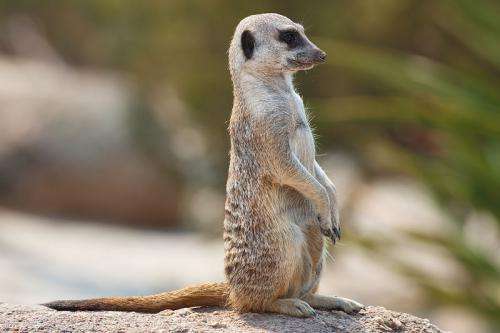October 13, 2011 report
Meerkats have ability to distinguish different voices

(PhysOrg.com) -- Vocal recognition is widespread in primates but a new study, published in Biology Letters, provides evidence that it may not be limited to humans and primates. The ability to recognize the voice of another may be more widespread in the animal community than previously thought.
The new study, led by Dr. Simon Townsend from the University of Zurich, looked at a group of wild meerkats living in the Kalahari Desert in South Africa. To test the possibility of vocal recognition, they conducted an experiment using simple audio playback.
In the meerkats foraging areas, the researchers placed two audio speakers to play recordings of the staccato calls that the meerkats make while foraging. It is believed that these calls work to keep the group of foraging animals together and let each other know an individual’s location.
They began by playing a call from one of the members of the group from one speaker. They repeated this later with another member’s voice from the other speaker. But it was the next part of the experiment that drew the awareness of the meerkats. The call of one meerkat was played from the first speaker and within seconds was played from the other speaker on the other side of the foraging area.
This caused the foraging meerkats to stop what they were doing. As if they knew that something was wrong. They were able to identify that there was no way the same voice could be coming from two different locations. This shows the researchers that while the calls made by the animals are similar, the tone and voice of each meerkat is different and the animals are able to identify the difference.
This study was the first to demonstrate vocal recognition in a non-primate animal species and the researchers note that this ability may be more widespread than originally thought, especially in animals that live in social groups.
More information: A simple test of vocal individual recognition in wild meerkats, Biology Letters, Published online before print October 12, 2011, doi:10.1098/rsbl.2011.0844
Abstract
Individual recognition is thought to be a crucial ability facilitating the evolution of animal societies. Given its central importance, much research has addressed the extent of this capacity across the animal kingdom. Recognition of individuals vocally has received particular attention due, in part, to the insights it provides regarding the cognitive processes that underlie this skill. While much work has focused on vocal individual recognition in primates, there is currently very little data showing comparable skills in non-primate mammals under natural conditions. This may be because non-primate mammal societies do not provide obvious contexts in which vocal individual recognition can be rigorously tested. We addressed this gap in understanding by designing an experimental paradigm to test for individual recognition in meerkats (Suricata suricatta) without having to rely on naturally occurring social contexts. Results suggest that when confronted with a physically impossible scenario—the presence of the same conspecific meerkat in two different places—subjects responded more strongly than during the control, a physically possible setup. We argue that this provides the first clear evidence for vocal individual recognition in wild non-primate mammals and hope that this novel experimental design will allow more systematic cross-species comparisons of individual recognition under natural settings.
© 2011 PhysOrg.com


















